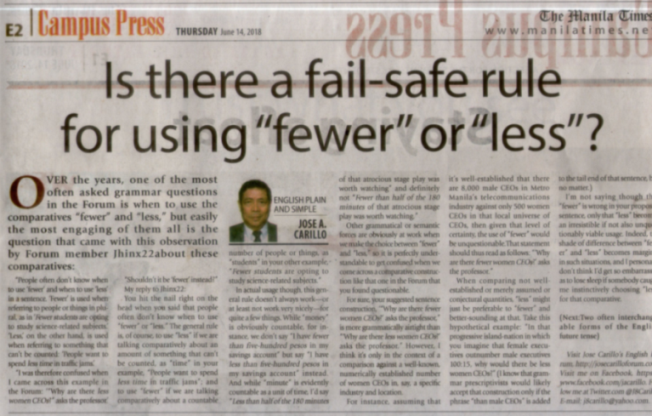Over the years, one of the most often asked grammar questions in the Forum is when to use the comparatives “fewer” and “less,” but easily the most engaging of them all is the question that came with this observation by Forum member Jhinx22 about these comparatives:
IMAGE CREDIT: THEWRITEPRACTICE.COM“People often don’t know when to use ‘fewer’ and when to use ‘less’ in a sentence. ‘Fewer’ is used when referring to people or things in plural, as in ‘
Fewer students are opting to study science-related subjects.’ ‘Less,’ on the other hand, is used when referring to something that can’t be counted: ‘People want to spend
less time in traffic jams.’
“I was therefore confused when I came across this example in the Forum: ‘“Why are there
less women CEOs?” asks the professor.’
“Shouldn’t it be ‘fewer’ instead?”
My reply to Jhinx22:You hit the nail right on the head when you said that people often don’t know when to use “fewer” or “less.” The general rule is, of course, to use “less” if we are talking comparatively about an amount of something that can’t be counted, as “time” in your example, “People want to spend
less time in traffic jams”; and to use “fewer” if we are talking comparatively about a countable number of people or things, as “students” in your other example, “
Fewer students are opting to study science-related subjects.”
In actual usage though, this general rule doesn’t always work—or at least not work very nicely—for quite a few things. While “money” is obviously countable, for instance, we don’t say “I have
fewer than five-hundred pesos in my savings account” but say “I have
less than five-hundred pesos in my savings account” instead. And while “minute” is evidently countable as a unit of time, I’d say “
Less than half of the 180 minutes of that atrocious stage play was worth watching” and definitely not “
Fewer than half of the 180 minutes of that atrocious stage play was worth watching.”
IMAGE CREDIT: VEREDJULIETTE.COMOther grammatical or semantic forces are obviously at work when we make the choice between “fewer” and “less,” so it is perfectly understandable to get confused when we come across a comparative construction like that one in the Forum that you found questionable.
For sure, your suggested sentence construction, ‘“Why are there
fewer women CEOs?’ asks the professor,” is more grammatically airtight than “‘Why are there
less women CEOs?’ asks the professor.” However, I think it’s only in the context of a comparison against a well-known, numerically established number of women CEOs in, say, a specific industry and location.
For instance, assuming that it’s well-established that there are 8,000 male CEOs in Metro Manila’s telecommunications industry against only 500 women CEOs in that local universe of CEOs, then given that level of certainty, the use of “fewer” would be unquestionable. That statement should thus read as follows: “‘Why are there
fewer women CEOs?’ asks the professor.”
When comparing not well-established or merely assumed or conjectural quantities, “less” might just be preferable to “fewer” and better-sounding at that. Take this hypothetical example: “In that progressive island-nation in which you imagine that female executives outnumber male executives 100:15, why would there be
less women CEOs?” (I know that grammar prescriptivists would likely accept that construction only if the phrase “than male CEOs” is added to the tail end of that sentence, but no matter.)
I’m not saying though that “fewer” is wrong in your proposed sentence, only that “less” becomes an irresistible if not also unquestionably viable usage. Indeed, the shade of difference between “fewer” and “less” becomes marginal in such situations, and I personally don’t think I’d get so embarrassed as to lose sleep if somebody caught me instinctively choosing “less” for that comparative.
 This essay, 1096th of the series, appeared in the column “English Plain and Simple” by Jose A. Carillo in the Campus Press section of the June 14, 2018 issue (print edition only) of
This essay, 1096th of the series, appeared in the column “English Plain and Simple” by Jose A. Carillo in the Campus Press section of the June 14, 2018 issue (print edition only) of The Manila Times
, © 2018 by the Manila Times Publishing Corp. All rights reserved.(Next:
Two often interchangeable forms of the English future tense) June 21, 2018